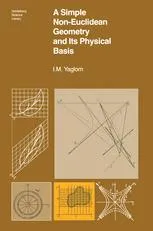A Simple Non-Euclidean Geometry and Its Physical Basis: An Elementary Account of Galilean Geometry and the Galilean Principle of Relativity
4.5
Reviews from our users

You Can Ask your questions from this book's AI after Login
Each download or ask from book AI costs 2 points. To earn more free points, please visit the Points Guide Page and complete some valuable actions.Welcome to the fascinating exploration of non-Euclidean geometry and its profound relevance to modern physics, as captured in "A Simple Non-Euclidean Geometry and Its Physical Basis: An Elementary Account of Galilean Geometry and the Galilean Principle of Relativity". This book offers an accessible yet comprehensive introduction to the fundamentals of Galilean geometry and its pivotal role in the development of the principle of relativity.
Detailed Summary of the Book
The book delves into the essence of non-Euclidean geometries with a focus on the Galilean geometry which, unlike the more commonly discussed hyperbolic and elliptic geometries, directly correlates with physical principles observed in our universe. The narrative begins by establishing a solid foundation in classical Euclidean geometry, allowing readers to appreciate the historical context and the paradigm shift that non-Euclidean concepts brought about.
Progressing from the basics, the text introduces the core principles of Galilean geometry, emphasizing its axiomatic foundations and inherent differences from Euclidean and Riemannian geometries. The author, Basil Gordon, systematically outlines how these differences not only provide a simpler geometric framework but also relate intimately to the physical phenomena described by the Galilean principle of relativity.
A significant portion of the book is dedicated to elucidating the relationship between geometry and physics, demonstrating how Galilean geometry forms a geometric backdrop for the classical mechanics articulated by Galileo and Newton. The text also lays the groundwork for understanding Einstein's later developments in relativistic physics, offering readers a bridge between classical and modern theoretical physics.
Key Takeaways
- Understand the fundamental differences between Euclidean and non-Euclidean geometries, focusing on Galilean geometry.
- Explore the historical and mathematical development of the Galilean principle of relativity.
- Gain insights into how geometric concepts relate to physical laws and principles, leading up to their application in modern physics.
- Appreciate the simplicity and elegance of Galilean geometry in describing real-world physical systems.
Famous Quotes from the Book
"Geometry, that paradigm of intellectual pursuit, finds its profoundest application in describing the physical universe in which we reside."
"The elegance of Galilean geometry lies not in its complexity, but in its unwavering correspondence to the fundamental truths of motion and relativity."
"To view the world through the lens of Galilean principles is to embrace a simpler universe governed by discernible laws."
Why This Book Matters
In an era dominated by rapid scientific advancement, understanding the foundational principles that underpin contemporary physics is more critical than ever. "A Simple Non-Euclidean Geometry and Its Physical Basis" offers a crucial perspective by reverting to the basics of geometry and demonstrating their relevance in the evolution of physical theories.
Through its elementary and approachable exposition, the book invites students, educators, and enthusiasts of mathematics and physics to grasp the significance of geometric principles in the broader context of scientific discovery. It serves as a reminder of the beauty and necessity of fundamental scientific inquiry.
Moreover, this book is a significant educational resource that helps bridge the gap between classical theories and modern physics, making it an invaluable asset for anyone looking to deepen their understanding of how geometry shapes our comprehension of the universe.
Free Direct Download
You Can Download this book after Login
Accessing books through legal platforms and public libraries not only supports the rights of authors and publishers but also contributes to the sustainability of reading culture. Before downloading, please take a moment to consider these options.
Find this book on other platforms:
WorldCat helps you find books in libraries worldwide.
See ratings, reviews, and discussions on Goodreads.
Find and buy rare or used books on AbeBooks.
1254
بازدید4.5
امتیاز50
نظر98%
رضایتReviews:
4.5
Based on 0 users review
"کیفیت چاپ عالی بود، خیلی راضیام"
Questions & Answers
Ask questions about this book or help others by answering
No questions yet. Be the first to ask!


